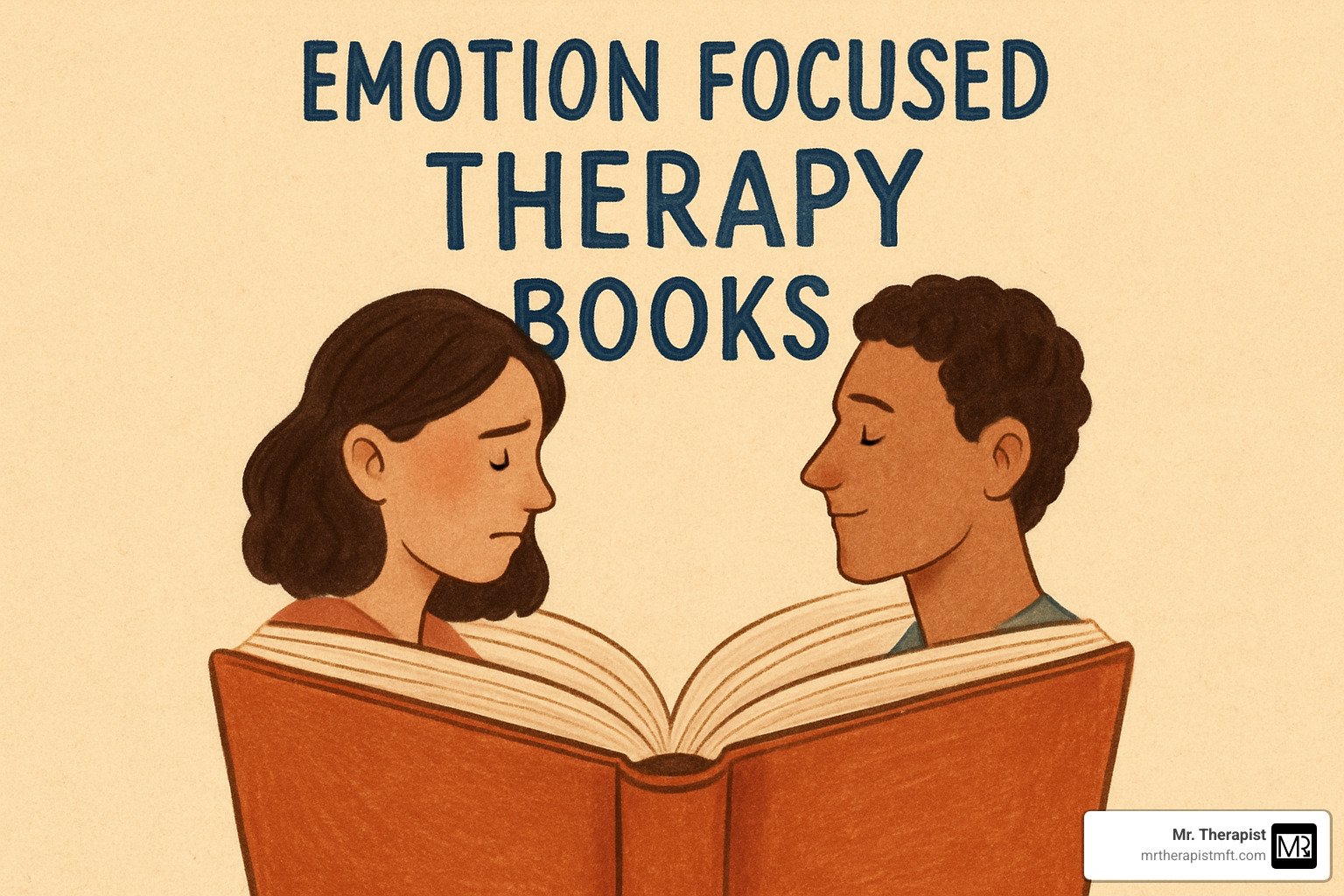
Why Emotion Focused Therapy Books Are Essential for Personal Growth
Emotion Focused Therapy Books offer powerful tools for understanding and changing your emotional life. Whether you’re struggling with anxiety, relationship issues, or feeling disconnected from loved ones, these evidence-based resources can guide your healing journey.
Top 5 Essential EFT Books:
1. Hold Me Tight – For couples seeking deeper connection
2. Attachment Theory in Practice – Comprehensive guide for individuals and families
3. A Primer for EFIT – Individual therapy and trauma healing
4. Becoming an Emotionally Focused Therapist: The Workbook – Skills development
5. Love Sense – Science-backed approach to relationships
As Dr. Sue Johnson notes, “There can be no knowledge without emotion. We may be aware of a truth, yet until we have felt its force, it is not ours.” This captures why reading about EFT isn’t just academic—it’s deeply personal and transformative.
EFT has remarkable reach: Dr. Johnson’s “Hold Me Tight” has helped over 1 million readers strengthen their relationships, while her works have been translated into more than 20 languages worldwide. These books don’t just explain theory—they provide practical exercises, real case studies, and step-by-step guidance for emotional healing.
The research shows EFT works because it views relationships as attachment bonds—the same deep connections we form as children with our caregivers. When we understand this, we can start healing the patterns that keep us stuck.
I’m Emmanuel Romero, a Licensed Marriage and Family Therapist who has guided countless individuals and couples through emotional challenges using EFT principles. Through my work at Mr. Therapist Counseling Services and experience supervising therapists, I’ve seen how Emotion Focused Therapy Books can accelerate personal growth and relationship healing.

Emotion Focused Therapy Books terminology:
– Books for emotional growth
– Books for healthy relationships
– Books on emotional resilience
What Is Emotion Focused Therapy (EFT) and Why Read About It?
Imagine having a roadmap to understand your deepest emotions and use them as a compass for healing. That’s exactly what Emotion Focused Therapy offers—and it’s why reading about EFT can be genuinely life-changing.
Emotion Focused Therapy is a warm, science-backed approach that puts your emotions right at the center of healing. While other therapies might focus mainly on changing thoughts or behaviors, EFT recognizes something profound: your emotions aren’t the problem to be fixed—they’re actually your guide to what you need most.
Dr. Sue Johnson developed this approach by weaving together attachment theory with decades of research on how we form deep emotional bonds. Think about it—from the moment we’re born, we’re wired to connect. EFT helps you understand these connection patterns and heal the wounds that might be keeping you stuck.
The core principles of EFT are beautifully simple yet powerful. Your emotions contain important information about what matters to you. Secure attachment bonds aren’t just nice to have—they’re essential for your well-being. Real change happens when you actually experience your emotions, not just think about them. And perhaps most importantly, healing happens in the safety of genuine connection.
What makes EFT so versatile is how it works across different situations. Emotionally Focused Individual Therapy (EFIT) helps people heal from trauma, anxiety, and depression by exploring their emotional world. EFT for couples helps partners break those painful cycles and create the secure bond they’re both longing for. EFT for families restores connection when everyone feels disconnected.
The neurobiology behind EFT is fascinating. Research shows that when you experience secure attachment relationships, your brain literally changes structure. Your emotional regulation improves, your stress response becomes healthier, and you develop greater resilience.
Reading Emotion Focused Therapy Books gives you direct access to these insights and practical tools, whether you’re working on your own growth or wanting to better support the people you care about. These books translate complex therapeutic concepts into accessible wisdom you can actually use.
For a deeper dive into how this approach works in practice, explore our comprehensive guide on the Emotion Focused Therapy Approach.
5 Essential Emotion Focused Therapy Books
Finding the right Emotion Focused Therapy Books can feel overwhelming when you’re ready to start your healing journey. After years of working with EFT principles and seeing which resources truly transform lives, I’ve identified five essential books that stand out for their depth, accessibility, and real-world impact.
These books aren’t just academic texts—they’re carefully crafted guides that meet you wherever you are in your emotional growth. Whether you’re a couple struggling to reconnect, an individual healing from trauma, or a therapist wanting to deepen your skills, there’s a perfect starting point here.
What makes these Emotion Focused Therapy Books special is how they translate complex attachment science into practical wisdom you can use immediately. Each book serves a unique purpose, from Dr. Johnson’s groundbreaking work with couples to specialized guides for individual therapy and professional development.

The impact speaks for itself—these books have been translated into dozens of languages and have helped millions of people worldwide. But beyond the impressive statistics, what matters most is how they can change your relationship with your emotions and the people you love.
Emotion Focused Therapy Books #1: Hold Me Tight

When couples ask me for the one book that can save their relationship, I point them to “Hold Me Tight: Seven Conversations for a Lifetime of Love.” Dr. Sue Johnson has created something remarkable here—a relationship guide that feels like having a wise, compassionate therapist right in your living room.
The book’s genius lies in its seven healing conversations that map out exactly how secure couples connect. These aren’t vague suggestions but specific, research-backed dialogues that address the core attachment needs we all share. Johnson shows you how to recognize the “Demon Dialogues” that destroy intimacy and replace them with conversations that build trust and emotional safety.
What I love most about this book is how it reframes relationship problems. Instead of seeing your partner as the enemy, you learn to see the negative cycle as the real problem. This shift changes everything because suddenly you’re fighting for your relationship instead of against each other.
The accessibility is remarkable too. Johnson takes complex attachment theory and makes it so clear that any couple can understand and apply it. Real case studies from her practice show you exactly what these conversations look like in action, while practical exercises give you tools to start healing immediately.
Whether you’re newlyweds or celebrating decades together, this book meets you where you are. I’ve seen it help couples prevent problems before they start and repair relationships that seemed beyond hope.
For deeper practice, consider adding The Hold Me Tight Workbook – A Couple’s Guide to a Lifetime of Love to your reading list. It provides structured exercises that make the seven conversations even more concrete and actionable.
Attachment Theory in Practice
This comprehensive guide takes EFT beyond couples work and shows how attachment theory can transform healing across all relationships. Dr. Johnson demonstrates that whether you’re working with individuals struggling with anxiety, families in crisis, or couples rebuilding trust, the same attachment principles apply.
The book’s strength lies in its clinical case examples that bring abstract concepts to life. You’ll see how childhood attachment patterns show up in adult relationships, and more importantly, how these patterns can be healed through new emotional experiences. Johnson doesn’t just explain what attachment wounds look like—she shows you exactly how they heal.
What makes this particularly valuable is how it bridges individual and relational work. Many people think they need to “fix themselves” before they can have healthy relationships, but this book reveals how attachment bonds are actually the pathway to individual healing. We grow and heal in relationship with others, not in isolation.
The global reach of this work is impressive—translations in eleven languages including Chinese, Danish, Dutch, Farsi, German, Italian, Korean, Romanian, Russian, Serbian, and Swedish show how universal these attachment needs really are. The audio version makes it accessible for busy therapists and individuals who prefer listening.
Whether you’re a therapist wanting to understand EFT across different populations or someone seeking deeper insight into how your early relationships shaped you, this book provides both the science and the practical wisdom you need.
A Primer for Emotionally Focused Individual Therapy (EFIT)
Emotionally Focused Individual Therapy (EFIT) represents a breakthrough in trauma healing and individual growth. This essential guide shows how attachment-based healing works when you’re working on your own emotional challenges, whether that’s anxiety, depression, or the lingering effects of past trauma.
The book introduces the “EFIT Tango”—a framework that helps you understand how individual therapy sessions can create lasting emotional change. Unlike approaches that focus primarily on managing symptoms, EFIT helps you transform your relationship with your emotions themselves. You learn to see emotions not as problems to solve but as wisdom to accept.
What sets this approach apart is its focus on micro-interventions—small but powerful techniques that can shift your emotional experience in the moment. The clinical exercises and session transcripts show you exactly what this healing process looks like, making abstract concepts concrete and accessible.
For trauma survivors, this book offers particular hope. It shows how attachment injuries from the past can be healed through new emotional experiences in the present. You don’t have to stay stuck in old patterns—your brain and heart can literally rewire themselves through this kind of focused emotional work.
The three stages of EFIT treatment provide a clear roadmap for growth, whether you’re working with a therapist or simply wanting to understand your own healing journey better. Each stage builds on the last, creating sustainable change that goes far beyond symptom relief.
For more detailed information about this approach, you can explore A Primer for Emotionally Focused Individual Therapy.
Becoming an Emotionally Focused Therapist: The Workbook
This hands-on workbook bridges the gap between understanding EFT theory and actually applying it in real life. While designed primarily for clinician training, the skills it teaches—emotional awareness, empathy development, and therapeutic presence—benefit anyone committed to personal growth.
The workbook format makes complex concepts immediately practical. You’ll learn emotion coaching techniques that help you guide others (or yourself) through difficult emotional experiences. The exercises for developing therapeutic presence teach you how to stay grounded and connected even when emotions run high.
What I particularly appreciate about this resource is how it teaches case formulation strategies—essentially, how to understand the deeper patterns beneath surface problems. Whether you’re a therapist working with clients or someone trying to understand your own emotional patterns, these skills are invaluable.
The marker-guided interventions show you how to recognize key emotional moments and respond in ways that promote healing rather than getting stuck. These aren’t just therapeutic techniques—they’re life skills that can transform how you handle conflict, stress, and emotional challenges in all your relationships.
Many EFT training programs use this workbook because it successfully translates abstract attachment theory into concrete skills you can practice and develop. The self-reflection questions promote the kind of personal growth that makes you more effective in all your relationships.
For additional practical resources, you might find our Emotion Focused Therapy Worksheets helpful for ongoing skill development.
Emotion Focused Therapy Books #5: Love Sense

“Love Sense: The Revolutionary New Science of Romantic Relationships” answers the question that keeps many people up at night: Is lasting love really possible? Dr. Johnson’s answer is a resounding yes, backed by fascinating neuroscience research that reveals how our brains are literally designed for connection.
This book shows you the science behind attachment bonds—how neurochemicals like oxytocin create the feelings of safety and connection we crave. Understanding this isn’t just intellectually interesting; it’s deeply reassuring. Your need for emotional connection isn’t weakness or neediness—it’s biology working exactly as intended.
Johnson outlines the three stages of relationship development in a way that helps you understand where you are in your relationship journey and what comes next. She explains why humans are designed for monogamy and how the intelligence of emotions guides us toward healthy relationship choices when we learn to listen.
The physical and psychological benefits of secure love are remarkable. Research shows that people in secure relationships live longer, have stronger immune systems, and experience less anxiety and depression. This isn’t just about feeling good—it’s about fundamental health and wellbeing.
What makes this book particularly valuable is how it helps people who’ve been hurt before believe in love again. By understanding that romantic love follows predictable patterns rather than random chance, you can work with your natural attachment system instead of fighting against it.
The global appeal is evident in its translations—currently in press in Estonian, Romanian, and Russian, with thirteen other language versions already available. This shows how universal our need for secure love really is, regardless of culture or background.
How to Choose & Use EFT Resources
Choosing the right Emotion Focused Therapy Books can feel overwhelming, but it doesn’t have to be. Think of it like finding the right tool for the job—each book serves a different purpose in your emotional growth journey.
Start with your biggest need. If your relationship is struggling and you need help now, “Hold Me Tight” offers immediate, practical guidance that couples can use together. It’s written in everyday language and gives you concrete steps to take tonight.
For those dealing with individual challenges like anxiety, depression, or past trauma, “A Primer for EFIT” provides a roadmap for understanding how emotions can heal rather than hurt. It’s especially valuable if you’re curious about how attachment wounds from childhood might be affecting you today.
Therapists and helping professionals will find “Becoming an Emotionally Focused Therapist” invaluable for developing clinical skills. It bridges the gap between knowing about EFT and actually practicing it effectively with clients.
If you’re the type of person who needs to understand the “why” behind everything, “Love Sense” delivers fascinating neuroscience research in an accessible way. You’ll find why your brain is wired for connection and how to work with your biology instead of against it.
Language shouldn’t be a barrier to emotional healing. Many core EFT texts are available in multiple languages—”The Hold Me Tight Workbook” comes in German, Russian, Spanish, and Ukrainian, while other titles have even broader international reach.
Cultural considerations matter too. The field is expanding to include more culturally responsive approaches, with specialized texts addressing how EFT principles apply across different cultural contexts. This ensures the healing wisdom of attachment theory can benefit everyone.
Workbooks versus theory books serve different learning styles. Some people love the structured exercises and step-by-step guidance that workbooks provide. Others prefer diving deep into the theoretical foundations first. There’s no wrong approach—many people benefit from combining both.
For practicing therapists, professional resources like facilitator guides and supervision materials are available through professional EFT organizations. These complement the core texts with practical training support you can’t get elsewhere.
The key is starting somewhere and building from there. Even reading one chapter can shift how you understand your emotions and relationships. For specific techniques and interventions, explore our guide to Emotionally Focused Therapy Interventions. You can also dive deeper into the scientific research on attachment and health that underlies all these approaches.
Emotion Focused Therapy Books aren’t just meant to be read—they’re meant to be experienced. The real magic happens when you start applying these insights to your own life and relationships.
Frequently Asked Questions about Emotion Focused Therapy Books
What’s the best starting point for therapists new to EFT?
If you’re a therapist just finding EFT, I recommend beginning with “Attachment Theory in Practice” by Dr. Sue Johnson. This comprehensive guide gives you the theoretical foundation while showing how EFT works across different contexts—couples, individuals, and families.
Start with the big picture first. Understanding attachment theory helps everything else make sense. Once you grasp why humans are wired for connection, the specific techniques and interventions become much clearer.
After building your foundation, move to “Becoming an Emotionally Focused Therapist: The Workbook.” This practical guide helps you develop the core skills through exercises and real-world applications. Many therapists tell me they wish they’d had this workbook during their training—it makes abstract concepts concrete.
Don’t try to learn everything at once. EFT is both simple and profound, which means it takes time to truly integrate. Read slowly, practice the exercises, and be patient with yourself as you develop this new way of understanding emotions and relationships.
Most EFT training programs combine reading with live supervision and practice. The books provide the foundation, but working with experienced EFT supervisors helps you apply these principles with real clients.
Which book should couples read first if therapy isn’t an option yet?
“Hold Me Tight” is hands-down the best starting point for couples. I’ve recommended this book hundreds of times, and couples consistently tell me it changed how they understand their relationship struggles.
Here’s what makes it perfect for couples just starting out: Dr. Johnson writes like she’s talking directly to you and your partner. She doesn’t use therapy jargon or make you feel broken. Instead, she helps you see that your relationship struggles make perfect sense when you understand attachment.
The seven conversations in the book aren’t just theory—they’re actual dialogues you can have with your partner. Many couples work through one conversation per week, giving themselves time to practice and integrate what they’re learning.
What if your partner isn’t interested in reading? Start by yourself. When you begin responding differently to relationship conflicts, your partner will notice. Often, they become curious about what’s changed and want to learn more.
One important note: If you’re dealing with serious issues like addiction, abuse, or major mental health concerns, reading alone isn’t enough. These Emotion Focused Therapy Books work best when you’re both emotionally safe and able to be vulnerable with each other.
How do EFT books address cultural or spiritual diversity?
The field of EFT has grown to accept different cultural and spiritual backgrounds, though we still have work to do. The core principles of attachment are universal—every human needs secure connection—but how we express and create that connection varies across cultures.
For Christian couples, “Created for Connection: The ‘Hold Me Tight’ Guide for Christian Couples” beautifully integrates biblical teachings with attachment science. It shows how our relationship with God connects to our human relationships, offering a spiritual framework for the EFT approach.
Dr. Paul Guillory’s work “Emotionally Focused Therapy with African American Couples: Love Heals” addresses the unique strengths and challenges that African American couples face. It recognizes how historical trauma, cultural values, and community connections influence relationship patterns.
The global reach of these books tells its own story. When Emotion Focused Therapy Books get translated into over 20 languages, it shows that people everywhere recognize themselves in these attachment patterns. The specific expressions might differ, but the underlying need for emotional safety and connection remains constant.
What we’re still working on: The field needs more culturally specific resources. If you don’t see your cultural background represented, that doesn’t mean EFT won’t work for you. The principles are sound—we just need more voices helping adapt them to different cultural contexts.
When possible, seek out therapists who understand your cultural background and can help you apply EFT principles in ways that honor your values and traditions.
Conclusion
Emotion Focused Therapy Books can truly transform how you understand yourself and connect with others. These aren’t just books you read once and put on a shelf—they’re resources you’ll return to again and again as you grow and face new challenges in life.
The five essential books we’ve explored each serve a unique purpose in your emotional journey. “Hold Me Tight” gives couples the tools to rebuild connection when things feel broken. “Attachment Theory in Practice” helps you understand the deeper patterns that shape all your relationships. “A Primer for EFIT” offers hope for individual healing, especially if trauma has left you feeling stuck. “Becoming an Emotionally Focused Therapist” develops the skills to help others (or dive deeper into your own growth). And “Love Sense” reveals the beautiful science behind why we need each other so deeply.
What I love most about these Emotion Focused Therapy Books is how they make the complex simple. You don’t need a psychology degree to understand that your emotions are trying to tell you something important. You don’t need years of training to start creating safer conversations with your partner.
At Mr. Therapist, we’ve seen countless clients find that their “problems” aren’t character flaws—they’re often just outdated strategies their hearts developed to stay safe. Reading about EFT helps people realize they’re not broken; they’re human beings doing the best they can with the emotional tools they have.
Of course, reading is just the first step. The real magic happens when you start putting these ideas into practice. Some people find they can make significant changes just by working through the exercises in these books. Others find they want professional support to go deeper into their healing journey.
Either path is perfectly valid. What matters is that you’re taking steps toward greater emotional resilience and stronger connections with the people you love. These books give you a solid foundation to build on, whether you’re working on your own or with a therapist who understands EFT principles.
Your capacity for healing and growth doesn’t have an expiration date. Whether you’re 25 or 75, your brain can still form new patterns. Your heart can still learn to trust. Your relationships can still become sources of comfort rather than stress.
If you’re curious about how this healing process unfolds step by step, check out our guide on emotionally focused therapy stages to see how change happens over time. Every expert was once a beginner, and every healthy relationship started with two people willing to be vulnerable with each other.
Your emotional journey matters. These books are simply good companions along the way.





